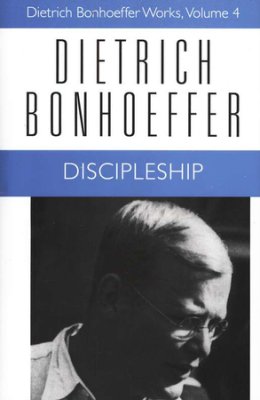Discipleship by Dietrich Bonhoeffer
Discipleship by Dietrich Bonhoeffer is the fourth book in the Dietrich Bonhoeffer Works series created by the Dietrich Bonhoeffer Society. contains two parts. Both parts extend his continuing thought about Christ in the midst of the church community. Early in the book, Bonhoeffer defines the purpose of discipleship (40): “Discipleship is joy.” In Part One (which is untitled although Bonhoeffer elsewhere called it “Discipleship in the Synoptics”), Bonhoeffer introduces the idea of discipleship as costly grace (chapter 1), and then explains the call to discipleship (chapter 2). Bonhoeffer emphasizes the importance of simple obedience in discipleship (chapter 3), discipleship and the cross (chapter 4), and the importance of discipleship for the individual (chapter 5).
Bonhoeffer takes the time to interpret the Sermon on the Mount in Matthew 5-7 (chapter 6). Bonhoeffer says that each chapter is related to discipleship. Matthew 5 shows the extraordinariness of discipleship. Matthew 6 gives the hidden simple righteousness of discipleship. Matthew 7 reveals the lost neighbor and the disciple. Bonhoeffer follows this with a commentary on Matthew 10 (chapter 7). He interprets the chapter as a call to the work of discipleship, which is sharing the gospel. He emphasizes the role of each person involved in harvest work and its connection to discipleship. Bonhoeffer states (187-188):
“God’s works cannot be done without God’s commission; otherwise, they would be done without God’s promise. But does this promise and commission to preach the gospel not apply everywhere? Both only apply where God has given the commission.”
Bonhoeffer warns that even people who are not saved can do the work of the Gospel (187):
“The fact that even Judas went out to do the work of Christ remains for us an inscrutable dilemma and a terrible warning.”
Bonhoeffer uses Part Two (“The Church of Jesus Christ and Discipleship”) to connect discipleship and the mission of the church. He addresses different questions (chapter 8) and then describes the importance of baptism (chapter 9), the body of Christ (chapter 10), the visible church community (chapter 11), and the saints and the governance of the church (chapter 12). He ends the book with a challenge for Christians to the image of Christ (chapter 12). As Bonhoeffer states:
“The follower of Jesus is the imitator of God. “Therefore be imitators of God, as beloved children” (Ephesians 5:1).”
The quotable Bonhoeffer continues throughout this book. Here are a set of quotes which I found interesting:
“Cheap grace is the mortal enemy of our church. Our struggle today is for costly grace.” (43)
“Cheap grace is preaching forgiveness without repentance; it is baptism without the discipline of community; it is the Lord’s Supper without confession of sin; it is absolution without personal confession. Cheap grace is grace without discipleship, grace without the cross, grace without the living, incarnate Jesus Christ” (44)
“Without discipleship, costly grace would become cheap grace.”(50)
“A change has to come about by calling people to obedience: only the obedient have faith!” (69)
“Daily the disciples receive this certainty anew from their communion with Jesus Christ, who is the fulfillment of all their petitions.” (157-158)
“It is the goods of the world which try to turn away the hearts of Jesus’ disciples.” (163)
“The disciples always see only Christ. They do not see Christ and the law, Christ and piety, Christ and the world. They do not even begin to reflect that; they just follow Christ in everything.” (163)
“If God provides for my today, He will just as much provide for my tomorrow.” (165)
“Judging others makes us blind, but love gives us sight.” (172)
Overall, I enjoyed this book. I found that Bonhoeffer has clearly been developing a thread which he started with Sanctum Communio, and Act and Being. He has continued to show in this book Discipleship the importance of following Christ, and its central importance in the mission of the church. While he touches on these ideas in Sanctum Communio and Act and Being, Bonhoeffer fleshes out his theology in Discipleship. Discipleship is easier to read than his previous books. At the same time, the book will challenge the Christian to grow to be more like Christ.
Discipleship would also be a great book for small group or Sunday School study. The book challenges not just individuals but also the church. Bonhoeffer challenges Christians to be real followers of Christ, not just fans of Him. Bonhoeffer also challenges the church to make following Christ the central church growth strategy. Bonhoeffer wrote this book during the Nazi regime of 1930s Germany. His message is just as important now in twenty-first century world as it was then.
You can read my book reviews for the following books by Dietrich Bonhoeffer:
#Bonhoeffer, #Discipleship,













